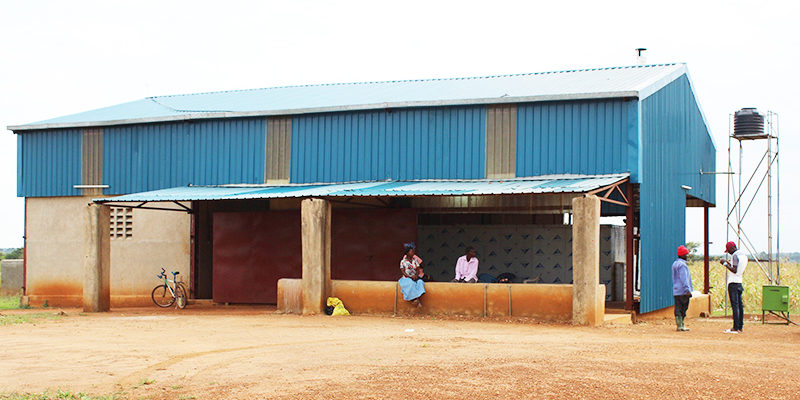
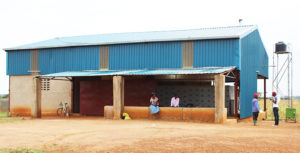
The Farm Uganda cassava batch dryer factory located in Kigumba, Kiryandongo district in Central Uganda.
Farm Uganda, is an agro processing company which has been in operation since 2008. It is located in Kigumba sub county in Kiryandongo district, Central Uganda and deals mainly in commercial farming, milling, packaging and trading of maize corn flour, white sorghum, and cassava flour. The company is co-owned by Mr. Sosimu Twesiga, Mr. Bamutaze Julius and Mr. Kalihanyu Claudio. Before 2015 and 2016, when the cassava projects; the Agricultural Technology Transfer (AgriTT) and Cassava Adding Value for Africa (CAVA) intervened respectively, the company faced a number of challenges including low quality and low volumes of cassava flour produced for the available markets like Uganda Breweries Limited (UBL) and the composite market users around Metropolitan Kampala, South Sudan and Rwanda. The company is the biggest supplier of cassava flour to the brewery that consumes about 3000 metric tons annually to brew the locally popular Ngule and Senator beer brands. Mr. Sosimu Twesiga, the business co-owner tells their story with the AgriTT and CAVA journeys using the cassava batch dryer technology.
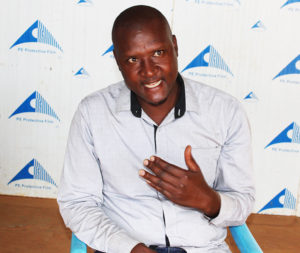 Sosimu states that the company had been working with the brewery since 2012 but faced so many challenges especially around cassava production and processing. Farmers were growing the disease susceptible materials, and drying the processed cassava was hectic especially in the rainy season. He adds that the drying method was very rudimentary leading to contamination of the product greatly affecting its quality to meet the market parameters. “Cassava flour was highly needed by the brewery for beer processing. However, post-harvest handling was so poor and we faced a big challenge of quality and meeting required volumes of the product for the brewery that had specific parameters of what they needed. After several rejections of the product, we then realized a need for a strategy and so came an idea to acquire a processing machine and also adopt better production technologies to counter the challenges.” remarks Sosimu.
Sosimu states that the company had been working with the brewery since 2012 but faced so many challenges especially around cassava production and processing. Farmers were growing the disease susceptible materials, and drying the processed cassava was hectic especially in the rainy season. He adds that the drying method was very rudimentary leading to contamination of the product greatly affecting its quality to meet the market parameters. “Cassava flour was highly needed by the brewery for beer processing. However, post-harvest handling was so poor and we faced a big challenge of quality and meeting required volumes of the product for the brewery that had specific parameters of what they needed. After several rejections of the product, we then realized a need for a strategy and so came an idea to acquire a processing machine and also adopt better production technologies to counter the challenges.” remarks Sosimu.
Sosim recounts the company’s journey since the AgriTT and CAVA project interventions. “Through UBL’s Agriculture Manager, Mr. Joseph Kawuuki we were made aware of the project that was working around cassava transformation in the areas of production and processing of High Quality Cassava Flour (HQCF). In 2015, Joseph linked me to the CAVA Uganda team that took us on, guided, mentored and availed us a lot of information and technical skills on how to boost our cassava business.
Through the team, I was made aware of the Agricultural Technology Transfer (AgriTT) project from which the company could greatly benefit. The Project would facilitate us to set up a modern cassava processing facility using the drying technology from China known as the batch dryer. This efficient equipment comprising of a bin dryer, cassava slicer, peeler, conveyor belt and miller would give Farm Uganda a comparative advantage over her competitors in the production and consistent supply of cassava flour that is of a higher quality and available all year round. We wrote a proposal highlighting our challenges around cassava production and processing to meet the market demand with consistent supply of a quality product. Farm Uganda won the project to which we were required to buy land and construct the processing shed. This cost us over 200 Million Uganda shillings. We successfully completed the construction and around December 2016, the machinery was brought in from China along with 2 Chinese engineers who installed, commissioned and trained the factory operators on how to use it. However, by the time all this was effected, the project life span had more less run out and the latter was done in a limited time of about only 7 days which was not sufficient. Since the training and commissioning of the system were limitedly done, this left us somewhat stuck because after the Chinese team left, the factory technicians with their limited technical know-how run the system and in the process, the original automated boiler got burnt. This befell us around February 2017 after the AgriTT project had closed, leaving us stuck and puzzled until CAVA came in and salvaged the situation.”
CAVA intervenes to address the AgriTT batch dryer situation to restore the company’s hope
Sosimu narrates how the Cassava Adding value for Africa Phase Two Project (CAVA 11) eased the company’s troubles. “During the entire process after the boiler was damaged in February 2017 and the machine became ‘a white elephant’, CAVA Uganda never abandoned us, and, since we had worked together under the AgriTT project, the relations came in handy. The CAVA Uganda Country Manager, Mr. Francis Alacho got into endless contact with partners from the Natural Resources Institute(NRI), UK seeking guidance and assistance on the matter, and their response was positive. Around June 2017, NRI sent Engineer Andrew Merchant who visited the sight, assessed the whole system and came up with a detailed report with recommendations to the systems boiler. There on around August 2017, I received good news from Mr. Alacho that CAVA had accepted to replace the boiler at no cost. Plans around this started with Engineer Andrew making a new boiler design that was fabricated in Nairobi and in May 2018, Engineer Andrew came and installed the new boiler along with a water system which was originally not there. He changed the boiler automations into manual setup and thoroughly trained the factory technicians on its operation. Our sincere gratitude towards this milestone goes to CAVA and NRI for restoring our hope past the ‘storm’. We are so excited because we are back in business and I can proudly say that since replacement, the new boiler is working quite well and the system is now fully functional.” says a cheerful Sosimu.
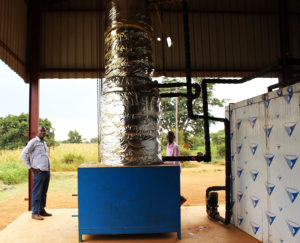
Mr. Sosimu Twesiga (left) shows off the new boiler that Engineer Andrew Merchant installed to ease processing at the factory
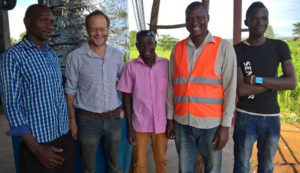
NRI Engineer Dr. Andrew Merchant (second left) after successful installation of the new boiler at the Farm Uganda Cassava processing factory. Also in the photo is Farm Uganda Co Director, Mr. Sosimu Twesiga (orange vest) with part of his factory team
Sosimu further speaks about CAVA’s mediations to the factory. “We have been trained in good post- harvest handling and processing of cassava roots into High Quality Cassava Chips/Flour (HQCC/F). CAVA introduced us to the open raised drying technology, provided us with the raised metallic drying racks and trained us in the process to obtain HQCF. We have also been linked to new markets. We are yet to sign a contract to supply 600kgs per day of HQCF to Riham- Harris International for biscuit manufacturing because they highly appreciate the quality. The batch dryer enables sustained supply of raw materials for the available markets since it produces large quantities. It processes about 4.6 tons per shift in a day if the process is well managed. “This machine is very incredible. We complete the entire value chain within just hours in a day. We receive fresh cassava root from the farmers at 8am and by 4:00pm that very day, we are already selling a finished product from what the farmer has sold to us as fresh root. The machine dries the processed chips in a period of between 4 to 6 hours before it is milled into HQCF that meets all the parameters ready for the target markets. And by the way, we often make a meal out of some of the flour and enjoy it as a family here at the factory’ smiles Sosimu.
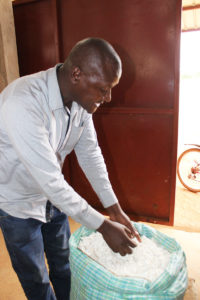
Left: Sosimu shows off the processed High Quality Cassava Chips and Right; He tastes some of the milled High Quality Cassava Flour ready for the market
Farm Uganda’s Fresh Cassava Roots supply model to sustain fresh root supply
The location identified for the cassava processing facility is in an urban Centre close to cassava production areas. To ensure consistent and timely supply of Fresh Cassava Root (FCR) to the factory, the company established a fresh roots supply model so as to enable continuous production of HQCF to meet the annual marketing targets. The company uses an out-grower scheme to achieve its annual fresh root requirement. It has entered contractual agreements with large scale cassava farmers like David Onya who owns about 300 acres of cassava in Kigumba. Another cassava farmer that supplies fresh root to Farm Uganda is Hully Akiza who owns over 150 acres. Other large-scale farmers have 200 acres plus and these also supply the company with resh cassava roots. The company also engages smallholder farmers that have at least a hectare of cassava with a yield potential of more than 12tons/ha. This has been made possible with the contractual 141 famer groups Farm Uganda has engaged with in Kiryandongo and Masindi districts. Additionally, Farm Uganda owns a 200acre demonstration farm that supplements the factory with fresh root in case of limited supply from the out growers. Other strategies around increasing supply to meet this demand are encouraging and promoting the use of the sun drying technology within the 141 farmer groups. Farm Uganda set up a 3acre demo garden of NASE 14 at the factory to train farmers in Good Agricultural Practices (GAPs) but also avail them multiplication material. “We are also encouraging the famers to venture into value addition and supply the company with already processed High Quality Cassava Chips (HQCC) that we can then mill into flour. These farmers have been extended skills and knowledge in new cassava production and processing technologies. We believe that by building their capacity we are solving issues around unstable supply of fresh roots from the smallholder farmers but also encouraging them to grow into large scale producers of fresh cassava root. These have appreciated and are continuously practicing the new knowledge.”
Benefits since the projects- As Farm Uganda and the people in Kigumba, Kiryandongo district
“The benefits are countless” he recounts and attributes all these achievements to the exposure gained through the projects. “Originally, Farm Uganda didn’t have land, and most of all we didn’t have such a building. My two business partners and I are also looking healthy and good because we have peace of mind since the factory is now fully in business. Our business is also growing, and we now receive many clients. I am also interacting with a number of NGOs working with cassava farmers. I was recently contacted by an NGO working with 15 districts in Northern Uganda to supply Farm Uganda with fresh cassava root. Also, as a company, our sales have increased. Prices by then were at 850 UGX a kilo but we now sell at 1,270 UGX a kilo of HQCF to the brewery and we feel that if we cause an impact, the prices will increase.
He adds that the community is also greatly benefitting. There is access to electricity and an improved road network. ‘when we got here in 2016, the road was impassable. The trucks ferrying the factory’s construction materials faced so many challenges, the road was narrow then and trucks skidded when it rained. But since the project, the Kiryandongo local government improved the road network to ease accessibility.’ Besides that, local farmers now have assured market for their FCR, and the issue of unemployment has been partly checked. The factory employs four permanent staff and casual laborers including 30 women peelers who are each paid UGX 1,000 per wheelbarrow of cassava peeled and also earn an additional UGX 500 per heap of peeled cassava roots washed. The additional casual laborers are youths that are paid about 60,000/- UGX for their labor.
Personal benefits and Company future plans
Sosimu narrates how his life and that of his 2 business associates has since changed. “Through my personal savings, I managed to recently move into my own house in Gayaza on which I spent over 100 Million UGX on construction, my children are in good schools and life is going on well. My other two colleagues are also progressing. Mr. Bamutaze is actually my neighbor in Gayaza at his own place that he constructed at close to 100 Million UGX while Mr. Kalihanyu bought a 50acre plot of land that cost him 50 Million UGX to expand his farming business.
A cheerful Sosimu adds “My team and I sit and strategize on how to move the business and win new clients but also share on each other’s personal growth plans and assist each other to achieve these. We have developed a new factory 10year plan for an extension to a fully- fledged processing unit in one place comprising of the dryers, storage facilities, weighing facilities-weigh bridge, cassava peelers, slicers and milling machines. We want to see this whole area turned into an industrial park and with one control system under one roof, we shall be unstoppable.”
As a pioneer of the technology, Sosimu advises interested investors to highly consider the batch dryer technology “The available dryer is smaller than the capacity of the market and if it will increase beyond that, we still need as more batch dryers as we can get so as to manage the growing market. The product is now needed more than ever. The confectionery market is large and this material is needed in lump sum. So, if someone out there wants this technology, I strongly encourage them to get it’s fantastic, manageable and very cost effective as it uses fuel wood.”
The Cassava Adding Value for Africa Phase Two (CAVA II) Project supports adding value and commercialization of cassava in Africa. CAVA II Uganda has successfully developed value chains for HQCF, by supporting investors to establish HQCF processing sites in Eastern, Northern and Central Uganda. It has also facilitated processors to supply on contract arrangements, HQCF, to end user industries such as rural bakeries, beer breweries and biscuit manufacturers who use it to make composite flour, beer and biscuits respectively. The project is implemented in 4 other African countries of Nigeria, Ghana, Tanzania and Malawi.
CAVA II is funded by the Bill and Melinda Gates Foundation through the Natural Resources Institute-University of Greenwich, UK.



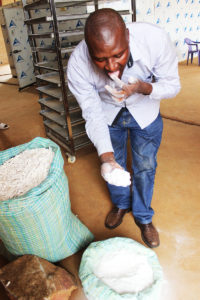





Leave a Comment